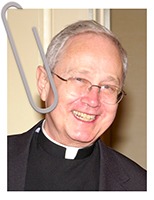The 6th chapter of John’s Gospel tells of the 5,000 friends Jesus fed when they followed him into the desert… and the many who left him when he challenged them with a “hard saying” to recognize him as the Bread of Life.
I began to think about Jesus’ friends.
What stage of his life are we talking about? Are we asking about how many.
- childhood friends,
- teenage friends,
- early adulthood friends,
- life-long friends,
- fair-weather friends until Palm Sunday
- friends who stayed with him until the bitter end at the foot of the cross?
Each can lead to prayer.
And then there are friends who discovered him later
- on their own “road to Emmaus” and the breaking of the bread,
- in their own “road to Damascus” experience,
- in the recorded stories he told and the life he lived,
- in breaking bread together,
- in the marginalized for whom he had and has a special preference?
The last category switches the emphasis from those who called him friend to those he called and treated as his friends (in contrast to standards of the day).
- Prostitutes, who are preferred to the pharisees (Mk 21:31-32;
- Publicans, who have precedence over the scribes (Lk 18:9-14; I 9: 1 – 1 0);
- Lepers, who are welcomed and cleansed (Mt 8:2-3, 11:5: Lk 17:12);
- The sick, (Mt 8:17) who are cured on the Sabbath Day (Mk 3:1-5; Lk 1 4: 1 -6; 1 3: 1 0- 1 3);
- Women, who are part of the group that accompanies Jesus (Lk 8:1-3; 23:49-55);
- Children, who are presented as the teachers of adults (Mk 18:1-4; 19:13-15; Lk 9:4 7-48);
- Humble people, who understand the mystery of the Kingdom better than the wise and learned (Mt 11:25-26);
- Samaritans, who are presented as models to the Jews (Lk 10:33, 17:16);
- The hungry, whom he welcomes as a flock without a shepherd (Mk 6:34; Mt 9:36; 15:32), to give them to eat (Jn 6:5-11), to provoke them into sharing (Jn 6:9);
- The blind, who receive vision (Mk 8:22-26; Mk 10:46-52; Jn 9:6-7). In contrast, the pharisees are declared blind (Mt 23:16);
- The lame, whose cure is a signal that Jesus can pardon sin without being blasphemous (Mk 2:1-12; Mt 11:15;
- The possessed whose expulsion of demons is a sign that the Kingdom of God has come;
- Adulterers who are welcomed and defended against thosejudged them (Jn 8:2, 11);
- The widow who the leaders said he should not have cured on sabbath (Lk 13:10- 1 7);
- Foreigners who are welcomed and attended to (Lk 7:2-10) and the Canaanite woman who succeeds in changing Jesus’ plans (Mt 7:24-30; Mt 1 5:22);
- The poor, who are told the Kingdom of God belongs to them (Mt 5:3; Lk 6:20) and not to the rich (Lk 6:24);
- Beggars, iwho in the parable they receive eternal life and the opulent rich man goes to hell (Lk 16:19-31);
- Thief, who is condemned yet received by Jesus into the Kingdom (Lk 23:40-43);
- Fishermen, who are called to be disciples of Jesus (Mk 1:16-20) while there is no doctor or scribe among the twelve;
- Zealots, some of them are in Jesus’ group (Mt 10:4; Mk 3:18) along with Levi, the publican (Mk 2:14).
Getting personal
We know Jesus is a friend to us. We would all like to think we are his friend. But…
- Are we friends with the Jesus who comes to us today in all the variations of the above shapes?
- How many of them do we know and count as our friends?
- Can we recognize our own blindness to the “hard sayings” that challenge us today?
Click below for an audio version of this Vincentian Mindwalk


Rom 16, 13 reads: "Greet Rufus, chosen in the Lord; and greet his mother—a mother to me also." If this…
Have a blessed Holy Week!
I have never thought about the people that were named in the Gospels. I would agree that they may be…
Generally, I love the laconic nature of Mark's Gospel. The Passion narrative is very compelling in its starkness, with one…
Father John, Blessings to you as you step cautiously down that new path. Grace and Peace be with you!